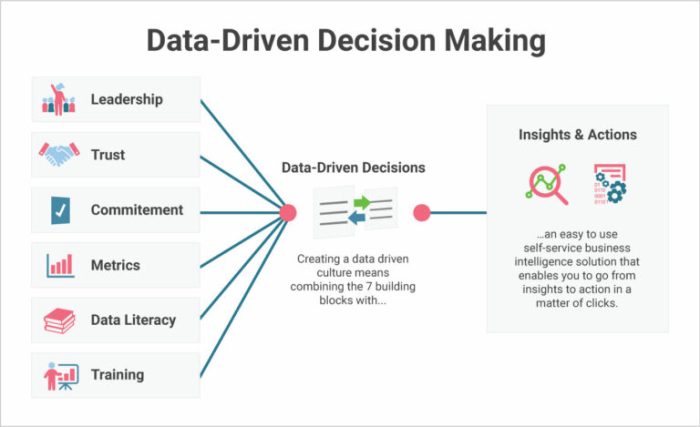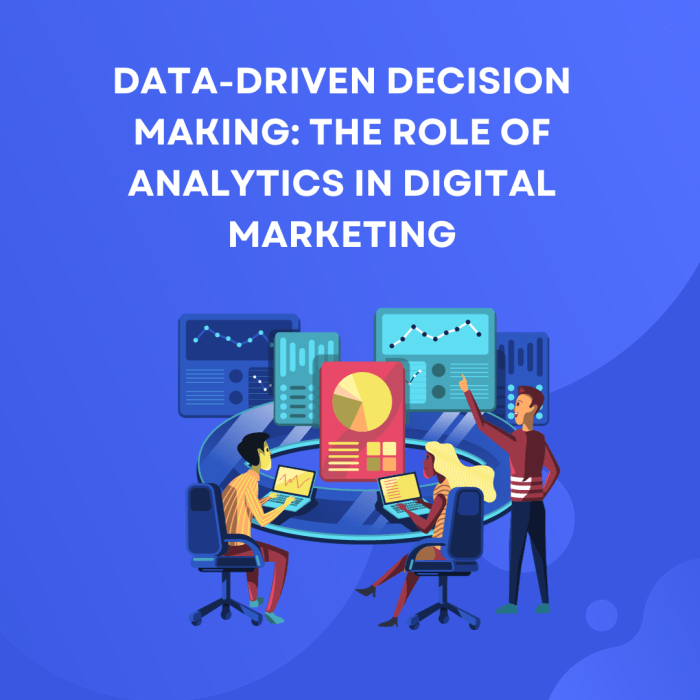Leveraging the power of data-driven decision making in digital marketing is no longer a luxury; it’s a necessity. In today’s dynamic digital landscape, businesses that rely solely on intuition risk falling behind competitors who harness the power of data to inform every strategic move. This exploration unveils how data empowers marketers to create highly targeted campaigns, optimize spending, and achieve measurable results, transforming guesswork into confident action and ultimately driving significant growth.
From understanding key performance indicators (KPIs) and identifying reliable data sources to mastering data analysis and implementing effective strategies, we’ll navigate the entire process. We’ll delve into ethical considerations, explore cutting-edge technologies shaping the future of data-driven marketing, and provide practical steps for businesses of all sizes to embark on this transformative journey. Prepare to unlock the potential of your data and propel your digital marketing efforts to unprecedented heights.
Ethical Considerations and Data Privacy

In the exciting world of data-driven digital marketing, ethical considerations and data privacy are not mere afterthoughts; they are the bedrock upon which sustainable and successful campaigns are built. Respecting user rights and maintaining data security isn’t just a legal requirement; it’s a crucial element of building trust and fostering long-term relationships with customers. Ignoring these aspects can lead to significant reputational damage and legal repercussions.Data privacy and ethical practices are paramount for maintaining consumer trust and fostering a positive brand image.
The responsible use of data ensures that marketing efforts are not only effective but also contribute to a fairer and more transparent digital ecosystem. This section will explore best practices for ethical data handling and compliance with relevant regulations.
Data Security and Compliance
Robust data security measures are essential for protecting consumer information. This involves implementing comprehensive security protocols, such as encryption, access controls, and regular security audits. Compliance with regulations like the General Data Protection Regulation (GDPR) in Europe and the California Consumer Privacy Act (CCPA) in the United States is mandatory. These regulations require organizations to obtain explicit consent for data collection, provide transparency about data usage, and offer users control over their data.
Failure to comply can result in hefty fines and severe damage to brand reputation. For example, a company failing to properly secure customer data leading to a data breach could face millions of dollars in fines under GDPR, in addition to the loss of customer trust. Implementing multi-factor authentication, regularly updating software, and conducting penetration testing are examples of proactive measures to bolster data security.
Transparency and User Consent
Transparency is key to building trust. Consumers should be clearly informed about how their data is being collected, used, and protected. This includes providing easily accessible privacy policies written in plain language and obtaining explicit consent before collecting or using personal data. For instance, a website might use a clear and concise consent banner that explains what data is being collected (e.g., cookies for website personalization) and allows users to opt-in or opt-out of specific data collection practices.
The language should be straightforward, avoiding jargon, and the consent process should be easy to understand and navigate. This approach not only ensures compliance but also demonstrates a commitment to ethical data handling, strengthening the relationship with customers.
Examples of Ethical Data Practices
Implementing ethical data practices requires a proactive and holistic approach. One effective strategy is to offer users granular control over their data preferences. This allows users to choose which types of data they are comfortable sharing and how that data will be used. Another best practice is to conduct regular data audits to ensure compliance with relevant regulations and identify potential vulnerabilities.
Furthermore, investing in employee training on data privacy and ethical considerations is crucial to ensure that all team members understand and adhere to the company’s data protection policies. Finally, regularly reviewing and updating privacy policies to reflect changes in regulations and best practices demonstrates a commitment to ongoing improvement and responsible data management. By prioritizing ethical data handling, companies not only mitigate legal risks but also build a stronger, more sustainable relationship with their customers.
Future Trends in Data-Driven Marketing: Leveraging The Power Of Data-driven Decision Making In Digital Marketing

The landscape of digital marketing is constantly evolving, driven by technological advancements and the ever-increasing volume of data available. Understanding and leveraging these emerging trends is crucial for marketers seeking a competitive edge and sustainable growth. The future of data-driven marketing is bright, promising more personalized, efficient, and impactful campaigns.The integration of artificial intelligence (AI), machine learning (ML), and predictive analytics is revolutionizing how marketers understand and interact with their audiences.
These technologies are not just enhancing existing strategies; they are creating entirely new possibilities for engagement and optimization.
Artificial Intelligence and Machine Learning in Marketing, Leveraging the power of data-driven decision making in digital marketing
AI and ML are transforming various aspects of digital marketing, from campaign optimization to customer service. AI-powered tools can analyze vast datasets to identify patterns and predict customer behavior with unprecedented accuracy. This allows marketers to personalize messaging, target the right audiences, and optimize campaigns in real-time. For example, AI can analyze website traffic to identify which content resonates most with specific user segments, enabling the creation of highly targeted content strategies.
Machine learning algorithms can also automate repetitive tasks, freeing up marketers to focus on more strategic initiatives. Consider the case of Netflix, which utilizes ML to recommend shows and movies based on individual viewing history, resulting in increased engagement and subscriber retention.
Predictive Analytics and Customer Lifetime Value
Predictive analytics leverages historical data and statistical algorithms to forecast future outcomes. In marketing, this translates to predicting customer behavior, such as purchase likelihood, churn risk, and response to specific campaigns. By accurately predicting these outcomes, marketers can proactively adjust their strategies to maximize ROI. For instance, a company might use predictive analytics to identify customers at high risk of churning and offer them personalized incentives to retain them.
This approach is particularly effective in increasing customer lifetime value (CLTV), a key metric for long-term business success. A successful example is Amazon, which uses predictive analytics to anticipate customer needs and suggest relevant products, fostering customer loyalty and driving sales.
The Rise of Programmatic Advertising and Automation
Programmatic advertising uses AI and ML to automate the buying and selling of ad inventory in real-time. This allows marketers to target specific audiences with highly personalized ads across various digital channels. Programmatic advertising offers increased efficiency, improved targeting, and greater transparency compared to traditional methods. Marketers can define their target audience based on various data points and let the algorithms optimize ad placement and bidding strategies to achieve the best possible results.
This leads to higher conversion rates and a better return on ad spend. Companies like Google and Facebook are pioneers in programmatic advertising, offering sophisticated platforms for marketers to manage their campaigns.
Preparing for the Future of Data-Driven Marketing
To thrive in this evolving landscape, marketers need to prioritize continuous learning and adaptation. This includes investing in data literacy training for their teams, embracing new technologies, and fostering a data-driven culture within their organizations. Building strong partnerships with technology providers and staying informed about the latest trends are also crucial steps. Finally, maintaining a focus on ethical data practices and respecting customer privacy is paramount to building trust and ensuring long-term success.
Embracing data-driven decision making in digital marketing isn’t just about collecting numbers; it’s about transforming data into actionable insights that fuel growth. By understanding your KPIs, leveraging diverse data sources, and mastering data analysis techniques, you can create highly targeted, effective campaigns. Remember, continuous optimization and ethical data handling are paramount. As you integrate these principles into your strategies, you’ll witness a remarkable transformation in your marketing effectiveness, achieving tangible results and establishing a sustainable competitive advantage in the ever-evolving digital world.
The journey towards data-driven success is an ongoing process of learning, adapting, and innovating – a journey that promises exceptional rewards.
Discover the crucial elements that make developing a strong brand identity for a digital marketing business the top choice.
Investigate the pros of accepting essential tools and technologies for running a thriving digital marketing agency in your business strategies.